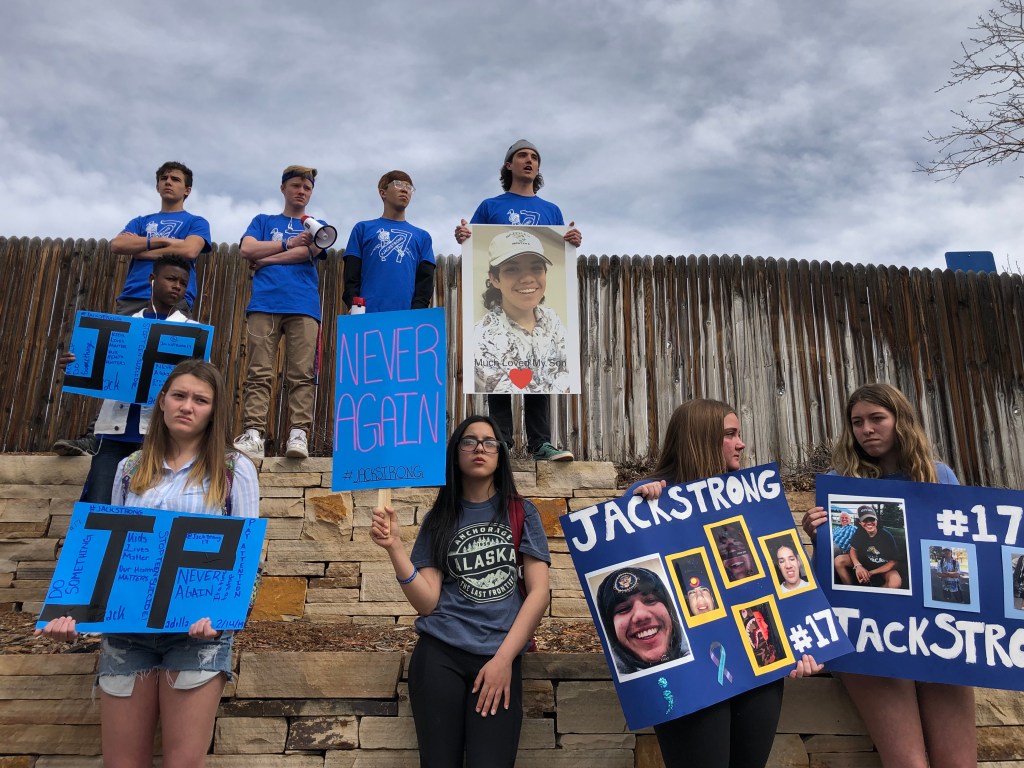John Padilla (top right) stands next to Giovani Villagrana (14) holding a photo of his brother Jack (15), who committed suicide in February, among students at Cherry Creek High School in Greenwood Village, Colorado, on Friday, April 5, 2019. Students walked out of class to raise awareness about mental health and bullying. (Photo by Rachel Wolf/Special to The Denver Post)
Students who walked out of Cherry Creek High School five years ago in protest at the school’s trivialization of a classmate’s suicide are now working to spread the message that young people can change the culture around mental health.
After 15-year-old Jack Padilla died by suicide in March 2019, several of his classmates and his brother started a group called “JackStrong” to promote more open discussions about mental health. Four core members met with The Denver Post on Monday to talk about their ongoing efforts.
The group began meeting to brainstorm soon after Jack’s death, said Gio Villagrana, 20, who now attends Metropolitan State University of Denver. They initially focused on events that would draw attention to the issue, such as a school walkout or a Colorado Avalanche game dedicated to Jack.

Since then, all have graduated, gone on to college or started careers, and recently testified in support of mental health legislation. Companies that have created mental health testing programs for students For grades 6 to 12.
But their work remains centered on helping young people help each other, said Jack’s older brother, John Padilla, 25, who now lives in Montana.
“I think the political climate and the social climate was very different in 2019,” he said.
The group is a celebration of Jack’s life, said Rick Padilla, John and Jack’s father, who also worked in mental health and became a suicide prevention manager for the Denver Department of Public Health and Environment after Jack’s death.
“We all want to be remembered and these kids have helped keep Jack’s memory alive,” he said.
The latest data on youth mental health in 2023 shows that since 2013, the number of young people reporting depression and possible suicidal thoughts has fallen. Colorado Healthy Kids Study The survey found that 11% of young people had thought about suicide in the past year, 9% had planned suicide, and 6% had attempted suicide.

Villagrana said he wasn’t sure whether young people’s mental health has actually improved since Jack died. Young people have a lot more to worry about than they did then, but they’re also more open about talking about their struggles. Adults are thinking differently, too. Jack’s mother recently spoken about whether the family would benefit from therapy, something Villagrana said would never have considered a few years ago.
That’s especially true when it comes to talking about suicide, said Janie Wishmire, 20, of Denver. During the 2019 walkout, students said adults at the school hadn’t discussed Jack’s death or the other student suicides that occurred earlier in the semester. The school held assemblies focused on suicide prevention, unity and resilience, she said.
“I don’t think suicide is as scary a word as it once was,” Wishmire said.
Young people need space to process their emotions after the suicide of a peer, especially because not everyone grieves at the same time. According to Boston Children’s HospitalAdults should be honest about the person’s suicide but not discuss details such as the method or speculate about the cause, the guidelines say. Memorials should not blame the person for their death, but they should not glamorize them either to avoid sending the message that dying is a way to gain sympathy or affection.
High school is hard for most people, and students need someone they can talk to when they’re struggling, said Lily Osborne, 20, a student at the University of Nebraska-Lincoln. They also need encouragement from others who have recently been through the same thing that life gets better after they graduate, she said.

“We just need to get there,” she said.
But getting to college doesn’t automatically make them feel better, as they have to deal with new pressures without friends or parents to support them, said John Padilla. The organization is trying to reach more students on college campuses, including by screening his documentary about mental health in Colorado and providing resources to viewers, he said.
